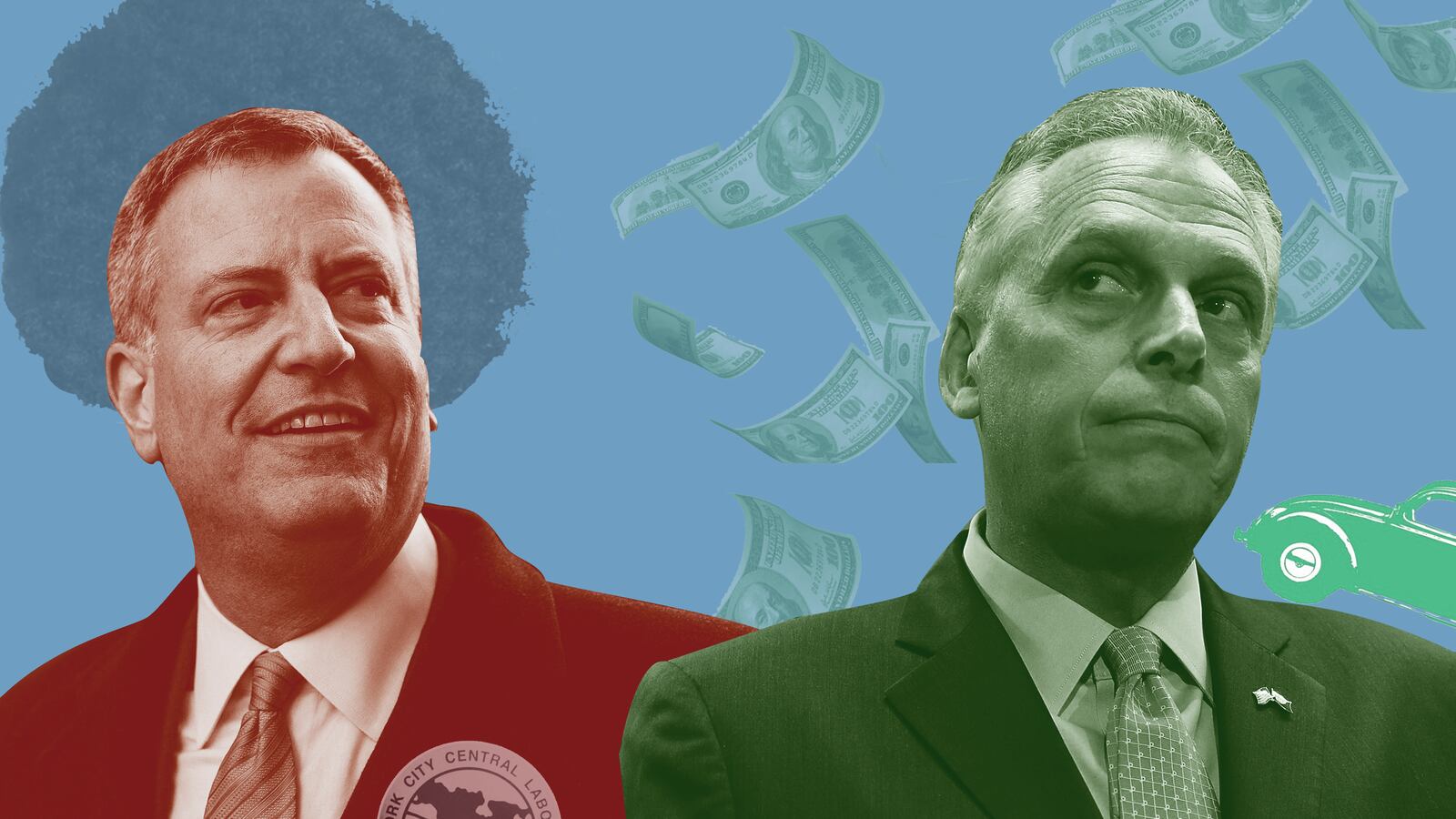For a brief glimmering moment last week, progressive Democrats could imagine Bill de Blasio as the future face of their party. New York's mayor-elect strummed every mystic chord. Tax the rich! Tether the cops! More money for unionized public schools!

In the wake of the de Blasio win, the party’s left wing could let its imagination travel to an exciting future. As Peter Beinart wrote in The Daily Beast: "Bill de Blasio’s mayoral campaign offers a glimpse into what an Occupy-inspired challenge to Clintonism might look like." Could Occupy Wall Street yet prove a harbinger rather than a fizzle? It's no secret that the Obama presidency has badly disappointed progressives in many important ways. It's also no secret that many progressives regard Hillary Clinton with apprehension and mistrust and long instead for an Elizabeth Warren candidacy and a full-throated attack on "Wall Street CEOs—the same ones who wrecked our economy and destroyed millions of jobs—[who] still strut around Congress, no shame, demanding favors, and acting like we should thank them."
Could it be? Could it really be?
Maybe. But it's much more plausible that the Democratic future is more accurately represented a little further south on I-95, in a much more competitive Democratic win: the election of Terry McAuliffe as governor of Virginia.
Progressive Democrats prefer to edit McAuliffe out of the 2013 election story. My Daily Beast colleague Michael Tomasky wrote an entire column meditating on the significance of the Virginia election with only the most glancing reference to the man at the top of the ticket.
What is there to say? The McAuliffe candidacy epitomized everything about their own party that progressive Democrats most dislike. The Daily Show compared the Virginia governor's race to a contest between pond scum and dog poo—a childish way of expressing the point, but heartfelt all the same. McAuliffe offers politics with the ideas left out, politics as a money chase, politics as a series of transactions between Democratic politicians and their rich donors. Here's a video of a much younger McAuliffe explaining his approach to politics, recorded by C-SPAN in 1988:
Fundraising needs to be run like a business. … What makes me different in collecting the checks … I will stop at nothing to try and get a check from you. If somebody says no to me … that's just to me the opening gambit of what could be a two-week or three-week process. I love it when people say to me, "Terry, I'm not going to give you a check. I hate you, I hate your candidate, get out of my office." To me, that's just the beginning. I just settle in, ask for the Diet Coke, and begin the negotiations. I have tracked people down all over this country. I had an individual - one of the largest corporations in the world - had made a commitment to raise some money for me. … I tried to call his office, repeated times, couldn't get through to his office, couldn't get past his third secretary … So what I did … the next morning I got up about 5:15 in the morning, I took a thermos of coffee, I went out to his home and sat in front of his home until about 6:30 in the morning until the individual came out to get the paper. I bolted out of my car and said to the invididual, "Mr. Chairman, I respect you and I respect your company. You certainly don't want me going back to Washington with a bad impression of America's businessmen. … I'm not leaving until I have [my money].
Along the way, McAuliffe himself became a rich man—although, curiously enough, without ever achieving the usual interim step of building a successful company. Money just somehow stuck to him. And what he got, he shared with his political patrons, especially Bill and Hillary Clinton. He raised an estimated $275 million for the Clintons, and when Bill Clinton's second term ended with the Clinton family broke and in debt, it was McAuliffe who personally loaned them the funds to buy their first post-presidential house. From 2001 until 2005, McAuliffe served as chair of the Democratic National Committee, presiding over the first election in which Democrats actually outraised and outspent the GOP.
McAuliffe saw politics less as a calling and more as an opportunity. As he told The New York Times in 1999, "I've met all of my business contacts through politics. It's all inter-related."
This is not a man to say, with Elizabeth Warren, "We don't run this country for corporations, we run it for people." McAuliffe is a big-tent Democrat who stands four-square in favor of both corporations and people. He can veer left when that is indicated: his signature theme in the Virginia governor's race was a promise to comply with Obamacare's mandate for the rapid and radical expansion of Medicaid in the state. He can also trim right when the winds blow that way. If politics is a negotiation with the donors, as McAuliffe said in 1988, it stands to reason that the politician must know how to give as well as take.
Progressives would like to think of the United States as seething with reformist political energy, poised for another of Arthur Schlesinger Jr.'s "cycles of American politics": akin to 1912-1917, 1930-1937, 1961-1965 … But that particular cyclotron stopped spinning a while ago. The story since 1970 has been one not of conservative and liberal alternation but of long periods of stasis punctuated by brief bursts of activism, right and left. 2009-2010 was the most recent of those left-wing activist bursts. Since then, it's been all budget-balancing, all the time.
Where Democrats have scored successes since 2010, those successes have been owed less to Occupy-style militancy, and much more to the seeming unquenchable determination of Republicans to render themselves unelectable. That's how McAuliffe won his own race after all.
Since the first near default of 2011, then followed by the second near default of 2013, the congressional Republican Party has worried and frightened the American financial and business communities. There remain plenty of national Republicans a businessperson can love. The party nominated one of them for president in 2012. New Jersey's Governor Chris Christie is more than acceptable to business leaders, as are many other governors, such as Wisconsin's Scott Walker and Ohio's John Kasich.
Yet the party has not ceased to explore the political margins in which it discovered Ken Cuccinelli. If anything, the appeal of the marginal is growing stronger. In 2012, the radical candidates for president were mostly joke candidates: Herman Cain, Donald Trump, Michele Bachmann. In 2016, the radical tendency in the GOP will be expressed by a United States senator from the party's most important state, a graduate of Princeton and Harvard Law. There's nothing impossible about a Ted Cruz nomination, in a way that a Cain, Bachmann, or even Gingrich nomination was impossible from the start.
As the GOP loses its hold on the center, it will lose its hold on power. And that will create a profound sequence of dilemmas for American business. As a general rule, business wants low taxes, balanced budgets, and light regulation from government. Yet individual businesses also want—and often much more urgently—much more specific things from local, state, and national governments. When those businesses want those things, they look for politicians who can deliver them.
Say what you will about Terry McAuliffe, but he delivers. That's the point of transactional politicians; they do transactions. And of course McAuliffe is allied and associated with the ultimate in American transactionalists: Bill and Hillary Clinton. As governor of Virginia, McAuliffe is now well positioned to do transactions. America's defense contractors, for example, are headquartered in McAuliffe's state. For some time, those contractors have faced the reality of a GOP increasingly willing to shrivel defense budgets. In 2013, they had to confront the news that a substantial minority within the GOP was also prepared to stiff them on their contracts. (The first effect of hitting the debt ceiling would be felt by government suppliers, not government creditors.) Can the official who oversees the state's roads talk to that state's most important industries? He sure can. Does he have things to offer? He does. Is he working for his health? He is not. Quid, meet quo.
It's true that if Republicans continue to disable themselves, Democrats have more freedom to indulge their progressive instincts. It's also true that if Republicans continue to disable themselves, Democrats have more scope to gain for themselves the support of the most powerful people in American society. If the party of business ceases to be a majority party, it may well happen that the replacement majority party will instead become the party of business—offering not a reprise of the New Deal, but instead lots and lots of individual new deals.
And if you're predicting the future of the Democratic party—and American politics generally—the deal-making way of Terry McAuliffe seems a much more likely outcome than the fight-the-power way of Bill de Blasio.






